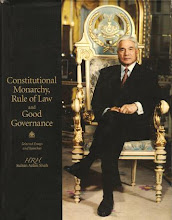The opposition may table a private member’s bill to amend Article 121 (1) of the Federal Constitution that restores the court’s judicial power if the government fails to do so.
“It is an option that we are considering seriously. We would do it if the government does not do it,” said DAP member of parliament (MP) for Ipoh Barat, M Kulasegaran.There has not been a private member’s bill since the 1970s. Any constitutional amendment would need two-thirds support of parliament, which means Barisan Nasional MPs would need to vote for it.
“In this country there is no procedure preference given to private member’s bill. If there is private member’s bill preference given, so many of my earlier application would have come up. It will never come up. It will be impossible to see the light of the day,” said Kulasegaran, adding that the opposition may still go ahead with the tabling of such a bill.
The original Article 121(1) conferred the “judicial power of the Federation” on the cou
 rts, but in an amendment in 1988, this was replaced by “judicial power vested” in the courts as “may be provided for by federal law”.
rts, but in an amendment in 1988, this was replaced by “judicial power vested” in the courts as “may be provided for by federal law”.Party Keadilan Rakyat (PKR) MP for Subang, R Sivarasa, said passing a private member’s bill was virtually impossible without the blessing of the government.
“So forget about the Article 121 amendment. It is never going to happen. Westminster has moved on and we are still in the boondocks.
“Even our neighbours have moved on, like Indonesia, Thailand and (the) Philippines. The procedure in parliament does not entertain any proposals like motions or private member’s bills of the opposition,” he said adding that even though if they were to file a private member’s bill, the matter would never be debated.
Sivarasa said former minister in the prime minister’s department Datuk Zaid Ibrahim had spoken to the opposition about judicial reforms.
He said Zaid stirred the interest of all parties, including the Bar Council, which wanted to see the doctrine of separation of powers and rule of law restored.
“Zaid was talking to us about a serious reform of the judiciary — first a judicial appointment commission as a constitution commission which will necessitate amendment to the constitution. He was also talking about amendment to Article 121. Unfortunately with his departure, I think all that is gone,” he said.
He said the current minister in charge of the law portfolio, Datuk Seri Nazri Aziz, was not looking at a constitutional commission.
“Which means it is a body that nobody is going to take too seriously and the basic framework of PM appointing judges is not going to change. Zaid was talking to us. We didn’t agree with a lot of what he said but it was a serious process.
“It should be properly done, with consultations and it takes time. Do it with consultation as Zaid had started. Now he (Prime Minister Datuk Seri Abdullah Ahmad Badawi) seems to be rushing purely for political purposes,” said Sivarasa, adding that a non-constitutional commission would not have enough clout.
Meanwhile, Kulasegaran welcomed the decision by the judges in both Datuk Seri Anwar Ibrahim’s and Raja Petra Raja Kamarudin’s cases last Friday.
Judge SM Komathy Suppiah ruled in favour of Anwar last Friday when she found the transfer form (for the case to be transfered from Sessions Court to the High Court for trial) signed by Attorney-General Tan Sri Gani Patail to be invalid.
The judge made the ruling as Abdullah had assured the nation that the AG would not be a part of the trial as the latter was being investigated for allegedly tampering with evidence in Anwar’s trial a decade ago.
In Raja Petra’s case, Judge Syed Ahmad Helmy Syed Ahmad ruled his detention under the Internal Security Act (ISA) as unconstitutional. He said the home minister had not followed the proper procedure under Section 8 of the ISA in issuing the detention order.
Wondering if other judges around the country would stand up against the executive branch of government, Kulasegaran said he hope for “some semblance of (the judiciary) coming to normalcy.” He added that there was a need of a thorough look at the appointment of judges to ensure that the process was transparent.
On Raja Petra’s case, Bar Council president Datuk Ambiga Sreenevasan said: “The decision of the learned High Court judge in the habeas corpus application of Raja Petra Kamarudin gives us hope that our judiciary has acted and will act with courage, integrity and independence when the liberty of an individual is threatened by the arbitrary use of power under the Internal Security Act 1960.”








No comments:
Post a Comment